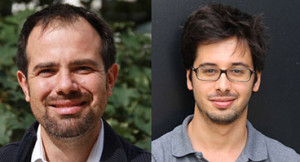Cris Beauchemin and Mathieu Ichou
INED researchers Mathieu Ichou and Cris Beauchemin answer our questions on the book they recently edited: "Au delà de la crise des migrants: décentrer le regard".

(Interview conducted in December 2016)
What is the aim of this book?
We wanted to move beyond received ideas on migration, the most widespread of which is that the refugee flows and migrant flows altogether are unilateral, permanent, and always from poor to rich countries. The fact is that migrant trajectories are much more varied.
Statistics show, for example, that emigration prevalence in Africa is relatively low and that the majority of African migrants remain on their continent, with specificities by region. Likewise, most international migrations to Europe are intra-European.
We chose the term “migrant” for the title to induce the notion of movement, as the term “immigrant” might suggest permanent, irreversible settlement. And since all immigration toward one country is also emigration from a departure society, the word “migrant” better encompasses the many characteristics of this phenomenon.
Is there a migrant profile, perhaps several?
Often the vision of migrants that gets disseminated is a miserabilist one. But while there is absolutely no reason to deny the precarious material conditions of migrants, extremely difficult conditions that upset the life paths of many, those representations only partially capture the reality, they only take into account one facet of it; i.e., the migrant as immigrant, but not as emigrant. Keeping in mind that immigrants do not form a homogeneous population, the overall fact is that individuals who emigrate for France have more economic and cultural capital—they are, on average, more highly educated—than those who stay in their country of origin. In other words, migrants are a selected group.
Have perceptions of migrants changed?
How people perceive migration flows is a matter of viewpoint; the perspective changes with the angle adopted. If we change lenses, adopting a historical view, we see that France experienced several en masse arrivals of populations over the twentieth century and that the conditions they were received in depended more on a “will to accommodate” (government policies and public opinion and perceptions) than on “accommodation capacity”. History shows that the notion of “accommodation capacity” is much less an indisputable reality than a rhetorical device to legitimate restrictive migration policies.
